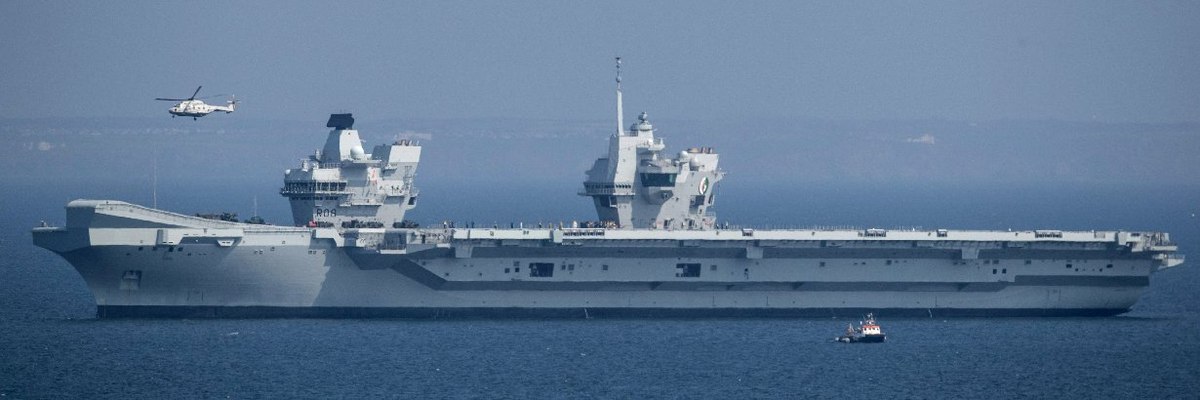Boris Johnson signalled this week his readiness to send one of Britain’s two new aircraft carriers off to the Far East. The aim, it seems, is to let China know that Britain won’t stand idly by in the face of bad Chinese behaviour generally and in the South China Sea in particular. Is this a welcome re-assertion that Britain, one of the world’s few nuclear powers and an elite permanent member of the United Nations Security Council, means business, or is it an absurd piece of posturing against a country so much more powerful than we are?
Naval deployment was not, of course, the most eye-catching piece of news this week regarding Britain’s deteriorating relationship with the People’s Republic of China. It was Mr Johnson’s U-turn on a decision made only six months ago about the involvement in our new 5G networks of the Chinese technology company, Huawei, that hit the headlines. Back in January the Prime Minister said his security experts had given the all-clear for Huawei to have a limited role in 5G rollout; now he says they’ve changed their minds.
No British company will be allowed to buy new Huawei kit from next January and all existing Huawei equipment will have to be stripped out by 2027. It means 5G will be delayed by two years or more and will cost a lot more money. The government says the security advice has altered following US sanctions against China, which have changed the way Huawei sources its own components.
Many say that’s a smokescreen and the real reason is political pressure from Donald Trump. And not just him. Mr Johnson’s own Tory backbenchers warned him that if he tried to stick with Huawei they’d vote against him in the Commons. And they have the numbers to make it a real threat. Johnson would have lost.
The Huawei U-turn is only the latest move in a much greater about-turn in Britain’s relationship with China.
Ten years ago, when the Tories came back into power, the new prime minister, David Cameron, announced that Britain was embarking on a ‘golden decade’ of friendship and increased trade with the world’s fast-growing superpower. When Xi Jinping became its president the British prime minister feted him on his visit to Britain, with pints in pubs and escorted visits to Old Trafford (Mr Xi is reputed to be a mad Manchester United fan).
That was nothing compared to the way Cameron’s Chancellor George Osborne treated the Chinese government. He led trade delegations to regions including Xinjiang, where he was accused of turning a blind eye to the Chinese government’s incarceration of over a million Uighur Muslims in what are effectively concentration camps.
Trade and friendship, it seemed, are much more important than human rights.
Now all is different. So much so, in fact, that the Chinese ambassador to Britain, Liu Xiaoming, warned last week: ‘You cannot have a golden era if you treat China as an enemy.’ So what’s changed? The British government would say that it’s not its aspiration for good relations with China that has been dumped, but rather that China’s changing behaviour has made it impossible. And it cites a catalogue of evidence to prove its point.
Most recently has been China’s alleged behaviour over coronavirus. Not only was China the source of the global pandemic but it tried to cover up the outbreak in Wuhan and strong-arm the World Health Organisation into underplaying the potential risk. All that, it’s claimed, led to the rapid spread of the virus worldwide with the terrible consequences from which, one way and another, we are all suffering.
Then there has been Hong Kong. China’s unilateral decision to impose tough new security laws on the former British colony in defiance of its agreement with Britain has provoked international condemnation. And it has alsop started to renew its sabre-rattling against Taiwan.
Analysts say it was President Xi’s rise to power that prompted the change in China’s behaviour. It has led to a more oppressive regime at home and a much more aggressive posture abroad. The treatment of the Uighurs, it’s claimed, has worsened under the Xi regime and the human rights of all Chinese citizens have deteriorated. President Xi has passed laws enabling him to remain in power for life and to require all Chinese companies to obey any instructions issued by the government and the army. Such companies include, of course, Huawei, so adding to security worries about western countries becoming dependent on it And he has taken a much tougher line on disputed islands in the South China Sea, claimed by other countries in the region, building military bases on reclaimed reefs and, in effect, telling everyone else to get used to it:.
The message could scarcely be clearer: China is now the big boy on the bloc.
It is this increased muscle-flexing in the Indo-Pacific region which has prompted Britain’s military bigwigs to propose sending one of the country’s new aircraft carriers to the region. Boris Johnson has apparently given it the nod. The idea is that it should serve as part of an international alliance of countries concerned about the trajectory China appears to be following. These include Japan, Australia, Canada and, of course, the United States. President Trump has taken a confrontational approach towards China, not just over trade and the alleged theft of American intellectual property, but over issues such as Hong Kong. The would-be President Biden takes much the same view. The idea seems to be that an alliance of western powers can stand up to China.
So earlier this week Vice-Admiral Jerry Kyd, the Royal Navy’s fleet commander, announced that the British navy was ‘going to be coming back to the Indo-Pacific’. He said: ‘Our ambition is to be absolutely persistent and forward-based there.’ If that does indeed happen it will be a reversal of a decision taken in the 1960s to withdraw Britain’s military presence ‘east of Suez’.
To critics of the idea it is simply jaw-dropping. They ask this question. Whatever do its proponents think it could achieve, even as part of an alliance? They point out that a British aircraft carrier, even it were supported by an escort of frigates and other support vessels provided by other members of the alliance, would be easy game for China’s vastly superior forces. They who could swot it like a fly, they say, using the long-range anti-naval missiles they already deploy and which are causing consternation in Washington about the vulnerability of American Pacific fleets based in Guam and elsewhere.
In any case, they add, gunboats aren’t what wars are fought with these days. Cyber warfare is where it’s at and if the Chinese became annoyed that a British aircraft carrier was buzzing its sphere of influence, it would be much more likely to respond with an unannounced cyber attack that could bring our infrastructure to its knees. It could achieve in an hour what Hitler failed to achieve in five years. And without a drop of blood being spilled.
In short, they say, deploying a British aircraft carrier in the Indo-Pacific is an absurd and futile piece of anachronistic play-acting, as though Palmerston were still foreign secretary and Britain still ruled the waves. Hasn’t anyone noticed, they say, that Britain is now a small country of under seventy million people and that China, with a population of one and half billion, has now (as Napoleon warned) ‘woken up’?
It is simply madness that, having allowed ourselves, through globalisation, to become utterly dependent on China for much of what we consume, we should now threaten it. The absurdity is compounded by the fact that Britain doesn’t yet even have its own fighter jets to be deployed from the carrier and would have to rely on the Americans teaming up with their F35s.
To those who see the proposed deployment in the Indo-Pacific in this way, it is symptomatic of a much broader absurdity of Britain trying, in the words of the former foreign secretary, Douglas Hurd, to ‘punch above our weight’. We flatter ourselves that because we gained a permanent seat on the Security Council back in 1945 we are still the power we were then. We boast that we are an ‘independent nuclear power’ when we all know that it isn’t independent at all and is unusable without the say-so of the Americans who supply the missiles.
So why, on this analysis, should we have any (highly vulnerable) aircraft carriers anyway? There is no military point in them, critics say, and they were commissioned by Gordon Brown more for the effect on the Rosyth naval dockyards in his constituency than for any military function. It’s the same with most of the defence budget: money wasted on wildly expensive kit that is irrelevant in the modern world.
It’s all part of the last hoorah. Boris Johnson fancies himself playing Winston Churchill, with the British navy on the broad seas and bullies like China kept in their place. It’s all of a piece with the fantasy of Brexit, Britain standing alone and forging a future as ‘Global Britain’.
Defenders of the proposed deployment would say that that was all extravagant nonsense. No one in their right mind thinks that Britain can impose Pax Britannia on the world any more. Neither, in truth, and nor does Boris Johnson.
The ambition is far more modest, they say, but it is worthwhile. If Britain can contribute to a military presence in the South China Sea, through which $5 trillion worth of world trade passes every year, and in so doing encourage China to think twice before trying its luck again as it has over the last ten years, then it will be worthwhile.
So what do you make of the plan to send an aircraft carrier out east? Is it a sensible, precautionary move taken with allies against a China that is getting too big for its boots, or an absurd gesture that harks back to an era of British naval might that is well and truly over?
What’s your view? Let us know.









